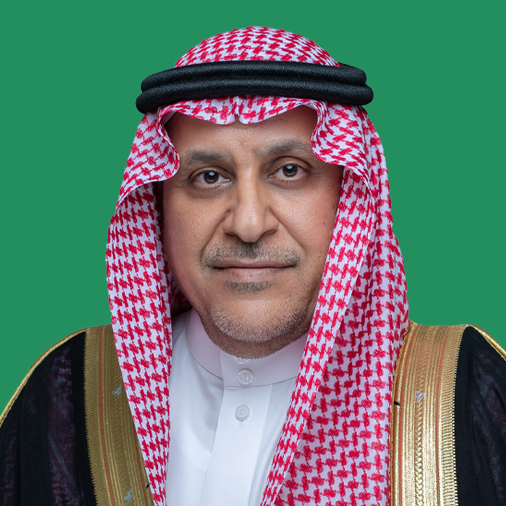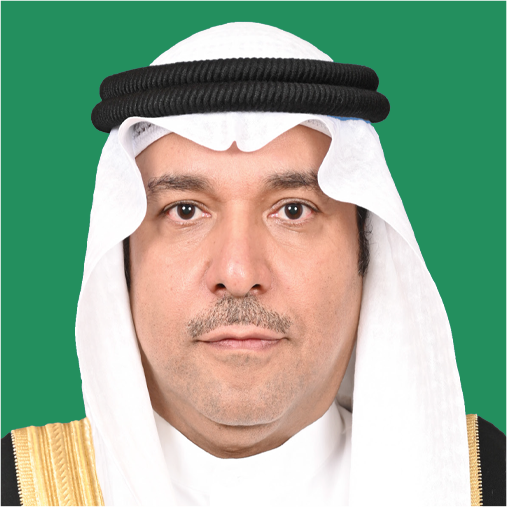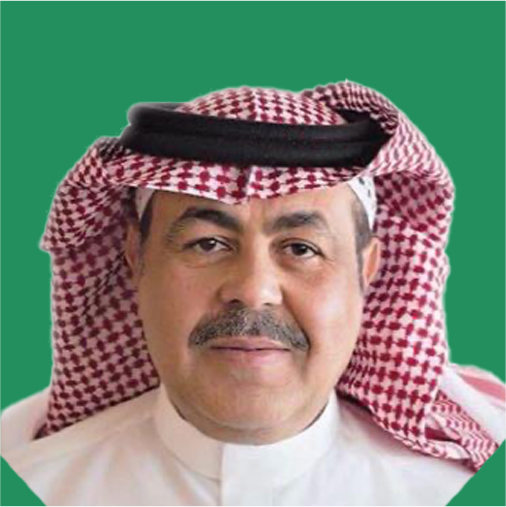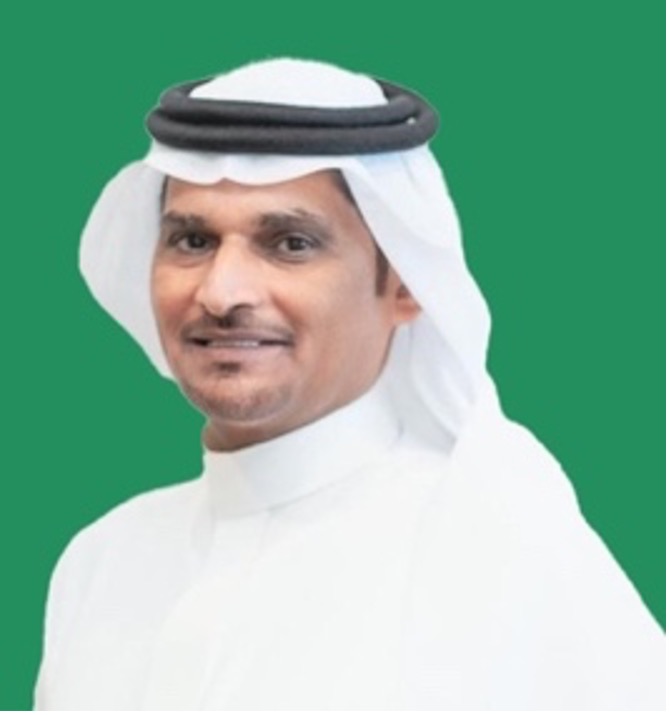Leaders - RCJY-Internet


Authority leaders
Chairmen of the Board of Directors of the Royal Commission for Jubail and Yanbu
The late King Fahd bin Abdulaziz Al Saud
(1395/9/21 – 12/7/1411)
His Royal Highness Prince Abdullah bin Faisal bin Turki Al Saud
(13/7/1411 – 5/1/1421)
His Royal Highness Prince Saud bin Abdullah bin Thunayan Al Saud
(8/1/1422 – 30/ 7/ 1437)
His Excellency Engineer Khalid bin Abdulaziz Al-Falih
(1/ 8/1437 – 28/12/1440)
His Excellency Engineer Khalid bin Mohammed Al-Salem
(29/12/1440 – Present)
Chairmen of the Royal Commission for Jubail and Yanbu
His Excellency Engineer Mohammed bin Faisal bin Turki Al Saud
(1414/12/29 – 1421/2/1)
His Royal Highness Prince Saud bin Abdullah bin Thunayan Al Saud
(1421/2/2 – 1439/7/16)
His Excellency Engineer Abdullah bin Ibrahim Al-Saadan
(1439/7/17 – 1443/7/27)
His Excellency Engineer Khalid bin Mohammed Al-Salem
(1443/7/28 – Present)
Chief Executive Officers of the Royal Commission in Jubail
Dr. Jameel bin Abdullah Al-Jishi
1/8/1396 AH - 7/10/1401 AH
Eng. Ahmed bin Ibrahim Al-Mubarak
20/8/1402 AH - 30/4/1412 AH
Dr. Jassim bin Mohammed Al-Ansari
8/5/1412 AH - 30/6/1426 AH
Eng. Mohammed Abdulaziz Al-Jwaiser
1/8/1426 AH - 17/4/1427 AH
Eng. Jassim bin Amer Al-Hajji
1/5/1412 AH – 7/5/1414 AH
3/3/1426 AH – 30/10/1430 AH
Dr. Muslih bin Hamid Al-Otaibi
1/11/1430 AH - 2/2/1440 AH
Eng. Mustafa bin Mohammed Al-Mahdi
5/2/1440 AH - 23/11/1443 AH
Dr. Ahmed bin Zaid Al-Hussain
24/11/1442 AH - 12/5/1445 AH
Eng. Mahmoud bin Saleh Al-Dheeb
13/5/1445 AH – Present
Chief Executive Officers of the Royal Commission in Yanbu
Eng. Sami bin Ahmed Mousalli
1396 AH - 1400 AH
Dr. Youssef bin Ibrahim Al-Turki
1400 AH - 1408 AH
Dr. Abdullah Mohammed Abduljawad
1408 AH - 1411 AH
Mr. Abdulrazzaq bin Abdullah Al-Qain
1411 AH - 1418 AH
Mr. Baddah bin Majdal Al-Qahtani
1418 AH - 1419 AH
Eng. Mohammed bin Abdulaziz Al-Jwaiser
1419 AH - 1426 AH
Dr. Aqili bin Dhaifullah Khawaji
1426 AH - 1432 AH
Dr. Alaa bin Abdullah Naseef
1432 AH - 1440 AH
Eng. Adnan bin Ayesh Al-Alouni
1440 AH - 1442 AH
Dr. Fahd bin Dhaifullah Al-Qurashi
1442 AH - 1444 AH
Eng. Abdulhadi bin Abdulrahman Al-Juhani
1444 AH – Present
Chief Executive Officers of the Royal Commission in Jazan
Dr. Alaa bin Abdullah Naseef
1436 AH - 1441 AH
Eng. Abdulhadi bin Abdulrahman Al-Juhani
1441 AH - 1444 AH
Dr. Fahd bin Dhaifullah Al-Qurashi
1444 AH - 1444 AH
Dr. Fahd bin Dhaifullah Al-Qurashi
1444 AH - 1444 AH
Speech by HE the Minister of Industry and Mineral Resources, Chairman of the Board of Directors of the Royal Commission for Jubail and Yanbu
تُعدّ الهيئة الملكية للجبيل وينبع واحدة من أنجح التجارب التنموية في تاريخ المملكة العربية السعودية، ونموذجاً رائداً في التخطيط الإستراتيجي والإدارة المتكاملة للمدن الصناعية. فمنذ صدور الأمر الملكي الكريم بتأسيسها في العام 1395هـ (1975م)، وهي تسير بخطى ثابتة نحو تحقيق التنمية المستدامة، مستندة إلى رؤى طموحة ومبادئ راسخة ترتكز على الكفاءة والابتكار والجودة.
لقد حققت الهيئة، إنجازات نوعية أسهمت في ترسيخ مكانة المملكة كمركز صناعي عالمي، حيث تدير أربع مدن صناعية كبرى هي: الجبيل الصناعية، وينبع الصناعية، ورأس الخير للصناعات التعدينية، وجازان للصناعات الأساسية والتحويلية، ومنطقتين اقتصاديتين. وتتميز هذه المدن بجاذبيتها للاستثمارات المحلية والعالمية، وببنيتها التحتية المتطورة، وبتكامل الخدمات الصناعية والبيئية والسكنية والتعليمية والصحية والترفيهية فيها، مما جعلها بيئة مثالية للنمو الصناعي والمعرفي، وقد لخصت ذلك في شعارها: (صناعة وحياة).
وتستشرف الهيئة المستقبل برؤية أكثر طموحاً، تستند إلى مستهدفات رؤية المملكة 2030، والإستراتيجيات الوطنية للصناعة والتعدين والاستثمار والخدمات اللوجستية، من خلال التركيز على قطاعات الصناعة والتعدين والصادرات، باعتبارها محركات رئيسة للنمو الاقتصادي وتنويع مصادر الدخل، واستقطاب الاستثمارات الصناعية النوعية، وتعزيز سلاسل الإمداد، وتوطين الصناعات التحويلية المرتبطة بالموارد الطبيعية المتاحة. كما تسعى الهيئة إلى توسيع نطاق اهتمامها بالقطاعات الناشئة والواعدة مثل السياحة والرياضة، عبر تهيئة البنية التحتية لشواطئها ومواقعها الطبيعية المميزة، وتطوير مشاريع ترفيهية ورياضية تسهم في رفع جودة الحياة وجذب الاستثمارات السياحية، بما يعزز من مكانة مدنها كمراكز للعيش والعمل.
كذلك تركز الهيئة على الاستثمار في التقنيات الحديثة مثل المدن الذكية وتطبيقات الذكاء الاصطناعي، فقامت بتطوير البنية التحتية والخدمات الرقمية في المدن الصناعية، وتحسين تجربة المستثمر والسكان على حد سواء، بما ينسجم مع التوجهات العالمية، ويخدم أهداف التنمية المستدامة، فضلا عن توفير المزيد من الفرص الوظيفية النوعية لأبناء وبنات الوطن.
إن هذه المفخرة الوطنية التنموية لم تكن لتتحقق لولا فضل الله تعالى ثم دعم قيادتنا الرشيدة المتواصل عبر عقود، وصولاً إلى العهد الزاهر لمولاي خادم الحرمين الشريفين الملك سلمان بن عبدالعزيز آل سعود -حفظه الله- يؤازره سيدي صاحب السمو الملكي الأمير محمد بن سلمان بن عبدالعزيز آل سعود ولي العهد رئيس مجلس الوزراء-حفظه الله-.
وختاماً لا أنسى جهود منسوبي الهيئة الملكية للجبيل وينبع المخلصة عبر عقود من الزمان في سبيل تحقيق تطلعات الوطن، سائلاً الله أن يوفقنا جميعاً لخدمة بلادنا الغالية، ومواصلة مسيرة البناء والنماء.
لقد حققت الهيئة، إنجازات نوعية أسهمت في ترسيخ مكانة المملكة كمركز صناعي عالمي، حيث تدير أربع مدن صناعية كبرى هي: الجبيل الصناعية، وينبع الصناعية، ورأس الخير للصناعات التعدينية، وجازان للصناعات الأساسية والتحويلية، ومنطقتين اقتصاديتين. وتتميز هذه المدن بجاذبيتها للاستثمارات المحلية والعالمية، وببنيتها التحتية المتطورة، وبتكامل الخدمات الصناعية والبيئية والسكنية والتعليمية والصحية والترفيهية فيها، مما جعلها بيئة مثالية للنمو الصناعي والمعرفي، وقد لخصت ذلك في شعارها: (صناعة وحياة).
وتستشرف الهيئة المستقبل برؤية أكثر طموحاً، تستند إلى مستهدفات رؤية المملكة 2030، والإستراتيجيات الوطنية للصناعة والتعدين والاستثمار والخدمات اللوجستية، من خلال التركيز على قطاعات الصناعة والتعدين والصادرات، باعتبارها محركات رئيسة للنمو الاقتصادي وتنويع مصادر الدخل، واستقطاب الاستثمارات الصناعية النوعية، وتعزيز سلاسل الإمداد، وتوطين الصناعات التحويلية المرتبطة بالموارد الطبيعية المتاحة. كما تسعى الهيئة إلى توسيع نطاق اهتمامها بالقطاعات الناشئة والواعدة مثل السياحة والرياضة، عبر تهيئة البنية التحتية لشواطئها ومواقعها الطبيعية المميزة، وتطوير مشاريع ترفيهية ورياضية تسهم في رفع جودة الحياة وجذب الاستثمارات السياحية، بما يعزز من مكانة مدنها كمراكز للعيش والعمل.
كذلك تركز الهيئة على الاستثمار في التقنيات الحديثة مثل المدن الذكية وتطبيقات الذكاء الاصطناعي، فقامت بتطوير البنية التحتية والخدمات الرقمية في المدن الصناعية، وتحسين تجربة المستثمر والسكان على حد سواء، بما ينسجم مع التوجهات العالمية، ويخدم أهداف التنمية المستدامة، فضلا عن توفير المزيد من الفرص الوظيفية النوعية لأبناء وبنات الوطن.
إن هذه المفخرة الوطنية التنموية لم تكن لتتحقق لولا فضل الله تعالى ثم دعم قيادتنا الرشيدة المتواصل عبر عقود، وصولاً إلى العهد الزاهر لمولاي خادم الحرمين الشريفين الملك سلمان بن عبدالعزيز آل سعود -حفظه الله- يؤازره سيدي صاحب السمو الملكي الأمير محمد بن سلمان بن عبدالعزيز آل سعود ولي العهد رئيس مجلس الوزراء-حفظه الله-.
وختاماً لا أنسى جهود منسوبي الهيئة الملكية للجبيل وينبع المخلصة عبر عقود من الزمان في سبيل تحقيق تطلعات الوطن، سائلاً الله أن يوفقنا جميعاً لخدمة بلادنا الغالية، ومواصلة مسيرة البناء والنماء.
Speech of HE the President of the RCJY
Since the era of the Kingdom’s founder, King Abdulaziz Al Saud—may Allah rest his soul in peace—the leadership of Saudi Arabia has embraced a strategic vision to harness the nation’s vast resources for the advancement of the country and the well-being of its citizens. Among the key pillars of this vision is the drive to diversify sources of income in order to reduce reliance on depletable oil. This includes expanding the industrial base through the development of the agriculture, industry, and mining sectors, with particular emphasis on petrochemical and mineral industries. Inspired by this forward-looking vision, the wise leadership embarked on a bold plan to utilize associated gas from oil production—previously flared and wasted—by approving the establishment of the industrial cities of Jubail and Yanbu. A royal decree was issued to establish the RCJY, granting it independent legal status and a dedicated budget to implement its ambitious mandate.
Indeed, work began in earnest in the RCJY’s cities, initiating a journey of challenge and achievement. The RCJY’s scope expanded with the inclusion of Ras Al-Khair City for Mining Industries and Jazan City for Primary and Downstream Industries, along with overseeing economic zones in both cities. As a result, the RC has attained global recognition and become a magnet for investors from within the Kingdom and abroad. This distinguished journey has led to cumulative investments amounting to SAR 1,457 billion by the end of 2024, positioning the RC as one of the Kingdom’s most vital economic arms. Due to its pivotal role in the national economic landscape, the RC plays a major role in realizing the goals of Saudi Vision 2030 and other national strategies. The RC is proud to have received the NIDLP Award as the top investment-attracting entity in both 2023 and 2024.
It is also noteworthy that while achieving remarkable economic and industrial milestones, the RC has remained steadfast in its environmental commitment. It has also supported environmental initiatives and established the principles of recycling and sustainable development. From its inception, the RC developed a comprehensive plan to implement an integrated environmental program to monitor industrial activities in a manner that maintains a sustainable balance between industrial development and environmental preservation.
The RC will, if Allah wills, continue its journey of achievement, guided by a strategic vision to remain the first choice for investors in the industrial sector and a key contributor to the growth and sustainability of industry in the Kingdom. It will remain committed to its mission of developing, enabling, and managing sustainable industrial cities that foster innovation, offer advanced infrastructure, and deliver exceptional services—ultimately contributing to a thriving economy and a vibrant society aligned with the aspirations of the nation and partners.
Indeed, work began in earnest in the RCJY’s cities, initiating a journey of challenge and achievement. The RCJY’s scope expanded with the inclusion of Ras Al-Khair City for Mining Industries and Jazan City for Primary and Downstream Industries, along with overseeing economic zones in both cities. As a result, the RC has attained global recognition and become a magnet for investors from within the Kingdom and abroad. This distinguished journey has led to cumulative investments amounting to SAR 1,457 billion by the end of 2024, positioning the RC as one of the Kingdom’s most vital economic arms. Due to its pivotal role in the national economic landscape, the RC plays a major role in realizing the goals of Saudi Vision 2030 and other national strategies. The RC is proud to have received the NIDLP Award as the top investment-attracting entity in both 2023 and 2024.
It is also noteworthy that while achieving remarkable economic and industrial milestones, the RC has remained steadfast in its environmental commitment. It has also supported environmental initiatives and established the principles of recycling and sustainable development. From its inception, the RC developed a comprehensive plan to implement an integrated environmental program to monitor industrial activities in a manner that maintains a sustainable balance between industrial development and environmental preservation.
The RC will, if Allah wills, continue its journey of achievement, guided by a strategic vision to remain the first choice for investors in the industrial sector and a key contributor to the growth and sustainability of industry in the Kingdom. It will remain committed to its mission of developing, enabling, and managing sustainable industrial cities that foster innovation, offer advanced infrastructure, and deliver exceptional services—ultimately contributing to a thriving economy and a vibrant society aligned with the aspirations of the nation and partners.




